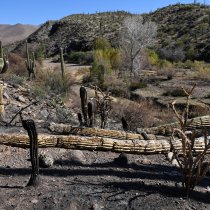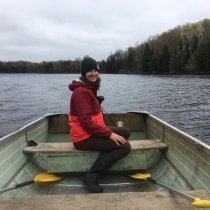Spotlight
Women in Ecology – Lark Heston
May 10, 2023
There are many different roads that lead to ecology, and those paths are as varied as the ecosystems we study. Some scientists grow up with parents who are passionate about the natural world, and others discover the field later in life. For women in particular, the journey to working in STEM fields comes with its own unique set of challenges. The Women in Ecology series continues to highlight the stories of women who have become successful in their field and who inspire the next generation of ecologists to follow in their footsteps.
Lark Heston's love for exploring and immersing in the natural world drew her to NEON. Now on her third season in Domain 07 (Appalachian and Cumberland Plateau), Lark has worked as a Temporary Field Technician (TFT) to collect data for research on a broad range of ecology subjects; she was recently promoted to full-time Lead Botany Field Technician. In this interview, Lark delves into the topic of gender bias and stigmas in the scientific community, as well as the importance of breaking down the barrier of "othering" by promoting inclusivity for all individuals.
Can you tell us about your career path? What inspired you to become involved in your current field? What keeps you motivated in your ongoing dedication to this field?

A periodical cicada mistaking Lark for a tree, much to her enjoyment! Photo credit: Lark Heston
My career path has been largely seasonal, with a Master's Degree thrown in the mix. I've worked for the Great Smoky Mountains Institute at Tremont and the Houston Audubon Society, and now this is my third season with NEON. Along the way, I've learned so many different skills, such as bird banding, shorebird surveying, invasive species removal, trail maintenance, and more. That doesn't even include all of the skills I've learned by being on the fauna, generalist, and now flora teams at NEON! It wasn't inspiration alone that led me to follow this career path because it's always been a part of who I am.
Ever since I could hold a pencil, I would write short stories about sea creatures, hand-copy articles from Zoobooks, and keep a daily log in my nature journal. When my mom gave me my first pair of binoculars, there were no longer any birds that went unseen. Although it wasn't a newfound inspiration that put me on this path, I am continually inspired every day. I'm inspired by the nature around me, the leading scientists in various nature-related fields, and people who are just now finding that spark of passion for nature. I was drawn to NEON specifically because I love to explore the natural world, and there's no better way to do that than to be fully immersed in it. You can't truly understand the Smoky Mountains until you've worked here in the rain for nine hours straight. On top of my love for field work, it's a bonus to be a data collector after being so focused on data analysis during my Master's research. Yet even with all of the data collecting in the field, we still get time to process things like invertebrates and leaf litter in the lab. I'm continually motivated by my job with NEON because of that perfect ratio of field to lab work and the ability to study so many different subjects within the scope of ecology.

(Left) A typical post on Lark's social media that's aimed to educate non-biologists about our natural world. (Right) a voucher Lark collected for the herbarium from the Mountain Lake Biological Station in Domain 07. Photo credit: Lark Heston
What research or work are you most proud of at this point in your career?
I'm most proud of publishing my undergraduate thesis in the Biological Journal of the Linnean Society, not because of the status symbol of being published, but because of the accomplishment of transforming decades of my advisor's freshwater turtle research data into a thought-provoking study. I think it's so important to look at data from different perspectives and ask new questions. Although my research wasn't published in an open-access journal (where anyone can read it for free without needing academic credentials), I feel very strongly that scientific knowledge should be public knowledge. It shouldn't take student status or a job in a university to gain access to the knowledge that's being communicated every day. On top of that, scientific communication should be easily understandable to all, even those without scientific education. So, one day, when I produce work that abides by those standards of accessibility and understandability, I will be even more proud.

Lark finds a spot to sit while measuring thousands of ferns for the Fern Vegetation Structure protocol. Photo credit: Lark Heston
What is the most fun part of being an ecologist? What is the most challenging?
The most fun part of being an ecologist is learning. It's not an exaggeration to say that I learn something new every single time I go out into the field. Every day, my eyes are opened to some new species, ecological process, or natural connection that I was blind to before. It always makes me wonder how much else is out there that we just don't see because we haven't looked. I love that when you allow yourself to relearn and honor that childlike curiosity that we all used to have, your world becomes so much bigger. The most challenging aspect is that there's not enough time in the world for me to learn everything. If I could live forever, I would just so I could walk every stream, flip every rock, find every bird, see and learn everything.
What challenges do women do women face getting into STEM fields, and what advice do you have for them?
As a woman who does fieldwork, it's challenging to deal with the stigma of my job being inherently more dangerous purely because I'm a woman. With proper safety measures in place, such as always having a partner with me in the field, I don't feel that I should be more fearful than my male colleagues. The wilderness dangers we face - copperheads, sprained ankles, thunderstorms - are equally dangerous to us all; it worries me that women might avoid jobs in the field because they've lived their whole lives being told they should be scared to go outside. At the same time, I don't want to invalidate anyone's lived experiences where they have encountered a dangerous situation related to their gender. I just hope those experiences can be used to teach others how to be safe outdoors, not to avoid it altogether. My advice is to follow your passions and learn how to be safe doing so.

Crossing over streams via logs is the most efficient - and fun - way to get to the NEON plots! Photo credit: Lark Heston
Are you confident that the scientific community will be able to solve the world's biggest ecological issues? What barriers are there?
I don't think any one group of people should be solving any of the world's issues alone. Ecological issues are human issues too, and I think humans from all niches should be in that conversation. For example, the scientific community may not have the same perspectives as indigenous communities, or the same technologies as engineering professions, or the same resources as governments. The main barrier I see that needs to be removed is the "othering" that all humans tend to do. When a community such as conservationists fall into "othering," the benefits that hunting, for example, can have on the ecological landscape may be overlooked because hunters are not being included in the conservationist circle. As another example, when the general public falls into "othering," the word of scientists may be distrusted because they are thought to be in another sphere than the general public. We can break down this "othering" barrier by striving for inclusivity for all people, no matter their backgrounds.
What do you hope to do in your field in the future?
I can't see myself having only one career path for the rest of my life, so I hope to accomplish many different things in the future. I'd love to write books and become a professor, high school science teacher, or birding guide. Ultimately, the theme of what I want to do in my life is to get people excited about nature and change their perspective to see humans as being very much a part of the natural world. I want to educate and inspire people who might not have come across a passion for nature otherwise and help bridge that gap between spheres of people who are at odds with each other. And maybe my secret mission is to convert everyone into a birder... But we'll see!



